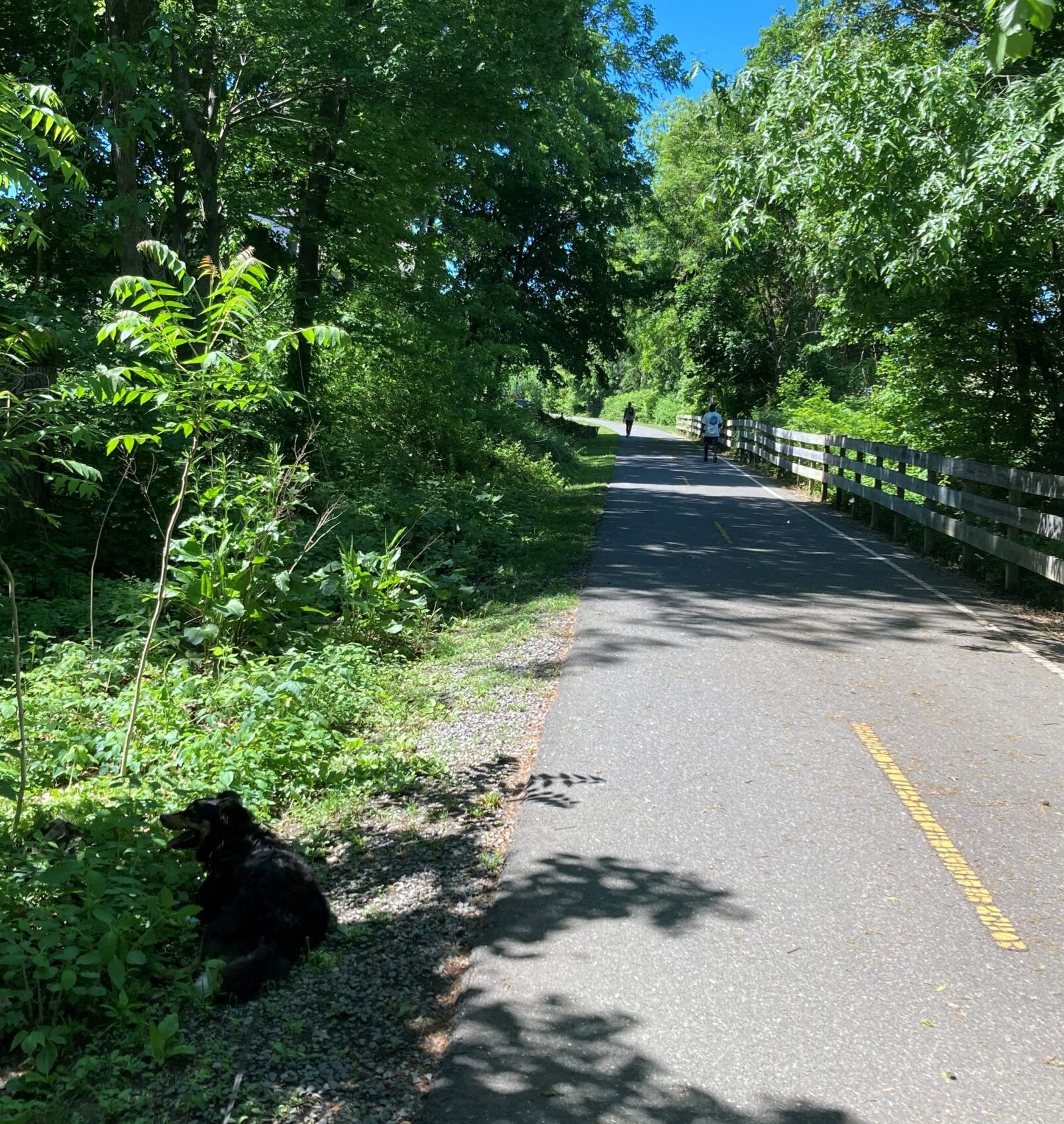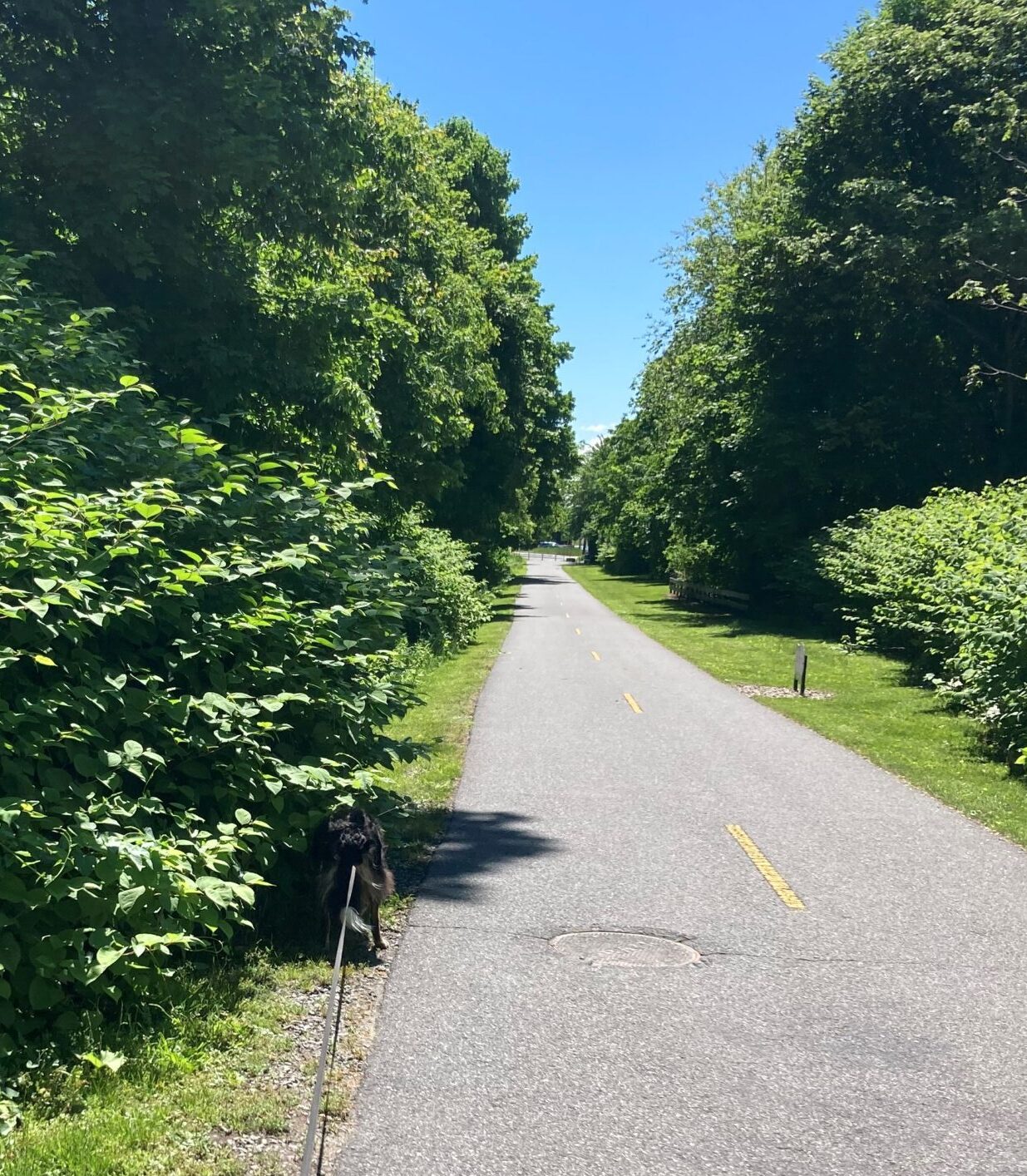Upon the subject of education … I can only say that I view it as the most important subject which we as a people may be engaged in.
-Abraham Lincoln
Waldo is on point at the forward end of the leash, in his usual position. He comes to a cross street and sits at the curb, waiting for me to come up. He dutifully stays put until I give the magic word, “Okay,” then, when he hears it, he bounds forward and continues in his Waldo quest for the perfect stick. It has taken a long time, and a lot of patience, but this is something he has learned to do pretty well. And he now does it without looking for a way to avoid it. He just does it.
I train Waldo for three reasons. First and foremost is his, and my, safety. Stopping at streets is an example of this. Second is for my convenience. I’ve finally gotten him to sit when I put on his Halti. It can be hard to get it on when he’s squirming around, which is what he does if he doesn’t sit. Lastly, I train him for fun. Teaching him how to jump over barriers, weave between poles and crawl through tunnels is something he likes to do (and receive treats for doing) and it doesn’t take much to get him to cooperate. We both enjoy the interaction and he gets to run off a lot of that border-collie energy the breed is renowned for. If he is going to live amongst people in the city, and he has no choice about that, he needs training – education.
I remember when my brother, my niece and nephew and I went on the trip to Tanzania to climb Kilimanjaro a few years ago. After the mountain, we went on a “safari” to several game parks in the area to see the animals. On the way to the Serengeti, we stopped at a Masai village and met the people there. Traditionally, they live in bomas — small collections of one room mud huts surrounded by a wall made of high piles of thorny acacia limbs. These bomas lay on dry semiarid grasslands in places where civilization has not yet deigned to encroach. The Masai are cattle herders and a family’s wealth is measured by the number of bony, scrawny, emaciated cattle they own. Their way of life is slowly being squeezed out of existence, like that of so many indigenous peoples, by the needs of modern-day civilization.
Tanzania has a poverty problem, as well as other troubles, and one of the things I felt as we visited was a desire to help somehow. Helping in any situation, truly helping, is a complicated thing and this is particularly true when it involves people of a different culture. I certainly didn’t, and still don’t, understand the Tanzanian situation well enough to know just how I might help, so I turned to our guides. I asked for the best way America and Americans could help the Tanzanian people. They said, “Send us teachers.”
This surprised me, but I immediately recognized its wisdom. “Give a man a fish and you feed him for a day. Teach him how to fish and you feed him for a lifetime,” said Lao Tzu. Traditionally, we give a helping hand by giving money. It’s easy and it’s cheap. However, it’s really not that much help and its effect doesn’t last long. Kennedy’s Peace Corps, if it hadn’t been corrupted by the CIA and other influential government pressures, might have been a great way to accomplish this. But alas, like so many other attempts at international aid, it failed to fulfill its promise.
America’s educational history is long. In 1635, the Boston Latin School, America’s first public high school, was created, and today, it is judged to be the #1 high school in Massachusetts. Thomas Jefferson pushed for the establishment of an educational system paid for by taxpayer dollars. That did not catch on right away, but today, we have a public school system from kindergarten through high school that is not only supported by taxes, it is required for all children to attend (unless their education can be arranged by other means). It was, and still is, felt that a democracy, even a representative democracy like ours, can only be workable if its electorate is well-educated. Smart move on the part of our ancestors.
In order for our system of government, and our very lives, to function well, the educational requirements of our citizens are much greater than it was in 1635. High school is no longer enough. To be competitive in today’s world, to not be a second, or even a third, rate nation, requires that our citizenry be highly educated. We have jet aircraft and spacecraft to build, dangerous diseases to control and irradicate, an internet to use and protect, an entire interdependent way of life to keep running in all of its complexity. Making college education, vocational education, all types of education, free is not a handout any more than making K-12 education free is a handout. It’s an investment in our future. Our society should decide what education is needed and provide that without forcing students to assume usury levels of incredible and ever-increasing amounts of debt. Instead of putting up a barrier to education, we should be encouraging the education of those who are so inclined and capable. Let’s not be reduced to having to ask other countries for their expertise to keep our society running and developing. Let’s not allow ourselves, even in a small way, to fall into the situation Tanzania finds itself in.
Waldo, sigh, needs further education as well. He’s good and has a good heart, but he still has to learn not to roll his furry head in the mud. Yeah, he did it again. Fortunately, he has someone to pay for his education.
And to wipe the mud off his face.



